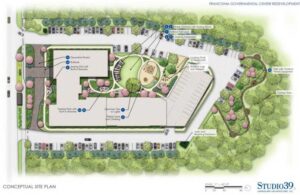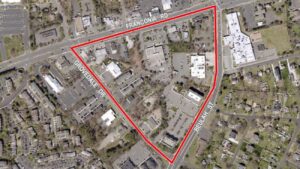
Renderings of Franconia Governmental Center redevelopment (image via Fairfax County government/Soto Architecture & Urban Design)
The Fairfax County Planning Commission voted 10-1 on Wednesday (May 7) to recommend that the Board of Supervisors advance a contentious plan that would allow affordable housing on the current Franconia Governmental Center site.
The vote came after most commissioners said they were satisfied concerns raised by nearby residents could be fully evaluated before an actual development plan is brought forward.
“We’re at the very early process, and we don’t have everything locked in,” Franconia District Commissioner Christopher Landgraf said.
The vote recommends supervisors approve a Comprehensive Plan amendment for what is known as the Franconia Triangle, a 22.75-acre site bounded by Franconia Road, Beulah Street and Grovedale Street that’s home to an array of residents, retail and commercial uses.
The Board of Supervisors is slated to hold a public hearing and consider the proposal as the very last item on its agenda next Tuesday, May 13.
Though the plan amendment will make other land use changes, about the only part that has drawn community opposition is the placement of up to 120 units of affordable housing on the 3.26-acre governmental center site at 6121 Franconia Road.
Critics outnumbered supporters during the course of two days of testimony (April 9 and 30) that drew more than 140 speakers.
Concerns included the impact of new housing on the corridor’s traffic, schools and infrastructure. Some opponents voiced fears about the impact of having families living in proximity to five gas stations in the immediate vicinity.

Boundaries of Franconia Triangle study area (screenshot via Fairfax County)
At the May 7 meeting, representatives of both the Fairfax County Health Department and Virginia Department of Environmental Quality addressed the health concerns.
Dr. Benjamin Schwartz, the county’s director of epidemiology and population health, said a review of phone complaints about health issues in the area from 2017 through 2024 uncovered nothing associated with symptoms of acute benzene toxicity.
Excessive intake of benzene through the air results in short-term impacts including dizziness, tremors, confusion and headaches, according to county health officials. Longer-term issues have led it to be deemed a carcinogen by the U.S. Environmental Protection Agency.
Though voting to support the project, Dranesville District Commissioner Alyssa Batchelor-Causey said more study on health implications should be a prerequisite before any housing development wins final approval.
“The community does have a point,” she said of health concerns raised. “We’re still very unclear about what type of risk this might actually pose. It is worthwhile to investigate it a little further.”
More broadly, though, Batchelor-Causey asked residents to be accepting of the need for new housing.
“Change is scary,” she said, urging the neighboring communities to show “courage and faith and move forward with conviction.”
The theme was echoed by Sully District Commissioner Evelyn Spain.
“Affordable housing is a foundational component of a thriving and reslient county,” she said.
The commission’s newest member, James Thomas of Springfield District, voted against recommending a comprehensive plan change, citing unresolved concerns about traffic and schools. He said the health implications need to be further fleshed out.
“I don’t think that’s something we want to be on the wrong side of,” Thomas said.
Several others on the panel said they deferred to medical experts on the health implications, adding that housing concerns needed to be in the forefront of county thinking.
“Affordable housing is incredibly important,” Providence District Commissioner Jeremy Hancock said. “We’re not going to reach our goals unless we look at the land the county has.”
The panel’s 12th member, Candice Bennett (at-large), did not participate in the discussion or vote as she is employed by one of the partners involved in the affordable housing project.
Led by a partnership of SCG Development, NFP Affordable Housing Corp. and Good Shepherd Housing, the proposed development would have up to 120 units reserved for households earning 30 to 80% of the area median income, according to a rezoning application submitted to the county in March.
Beyond the governmental center site, the plan amendment would revise the county’s land use guidance to allow:
- Housing, including 30 multi-family units and 63 townhouses, on a 6.59-acre parcel on Beulah Street that currently houses a single-family home and office building
- Redevelopment of a commercial parcel occupied by Franconia KinderCare with 16 attached townhouses
- Increased density for any redevelopment in areas zoned for retail use
Under the amendment, Franconia Triangle would be planned for a total of 79 townhouses, 150 multifamily apartments, 44,520 square feet of office space, 62,512 square feet of retail, and 34,921 square feet of institutional space, including the existing church and fire station.
No changes are proposed to Olivet Episcopal Church and the Franconia Volunteer Fire Station.
Operations of the Franconia Governmental Center are scheduled to move later this year to facilities currently under construction on Beulah Street. That parcel will include a new Kingstowne Library, police substation, child-care center, senior center and museum.
Reprinted from FFXNow. See the original here.
